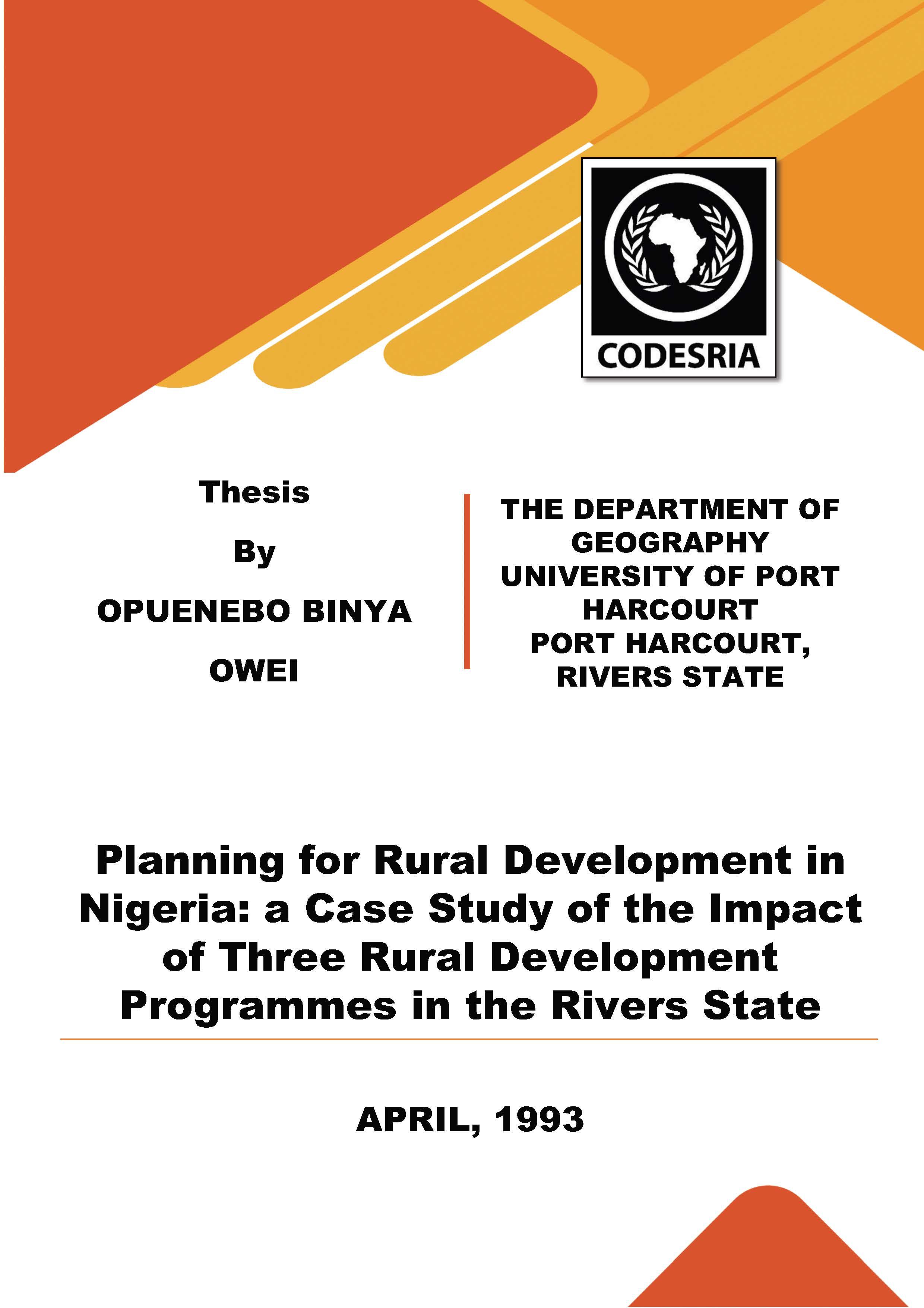Planning for Rural Development in Nigeria: a Case Study of the Impact of Three Rural Development Programmes in the Rivers State
Keywords:
Rural Development, Nigeria, Rivers StateSynopsis
Rural development problems have become the most enduring ones in Nigeria's development planning experience. The
Rivers State which is an integral part of the country suffers same. To date both the federal and state governments
programmes conditions have initiated and aimed at improving of rural people. Such implemented several the socio-economic
programmes have ranged from single-sector agricultural programmes to more integrated attempts in recent years. Also, the scale of rural development programmes have become more grandiose and more expensive. However, the fact remains that rural areas are still bedevilled by poverty and low productivity. A number of arguments have been made to account for this situation.
One of the most critical of these has been the failure of programmes in achieving their objectives. Explanations for this trend range from management problems including poor implementation and funding, to the politics of the rural development planning process. More needs to be done however, in order to decipher the inter-relationships between factors influencing programme planning and implementation; and between key actors involved in the different agencies. This study is a contribution in this direction.
Based on the evaluation of three priority rural development programmes: the DFRRI feeder roads; the agricultural extension programme and the School-to-Land programme, the study attempted to measure the direct social and economic impacts of rural communities in the Rivers State. For each programme, a set of indicators of change and measures of such indicators were derived. A set of three criteria - incarne, productivity and social and economic welfare formed the basis of impact assessment. These criteria were derived from programme objectives. The study covered a total of twenty-two villages and towns in five local government areas of the State and covered the period from 1985 to 1992. Data collection techniques utilized both person-to-person questionnaire administration and interview schedules at agency and community levels.
Data analysis using statistics showed that inferential and descriptive the incarne situation in study villages had not improved. In many cases it had actually worsened. Productivity on the other hand had generally increased but this increase was not attributed to the intervention of the programmes. Social and economic welfare has also not improved. Distributional impact
showed instances of discrimination against women and poorer rural people.
In the case of the extension programme, very few have benefited from the services, either in form of advice or inputs. The School-to-Land programme has succeeded largely in antagonizing local people and the impact of the feeder roads programme has been watered down by unusable condition for most of the year. When the impact of the programmes were examined in
the broader context of their specific programme environments, analysis showed conflicts, lack of coordination, deliberate interventions and poor planning.
Other factors were implementation problems including mismanagement, the absence of monitoring and evaluation procedures and absence of public participation. The study also emphasized the complexity of the programme environment particularly its influence on programme design and implementation procedures. In each case study several actors exist who by their intervention influenced the scale of programmes, funding and other elements of design, thereby contributing to the observed dichotomy between the objectives the programmes were initiated to achieve and what the actual impact from their
implementation had been on the intended beneficiaries.
Downloads
References
Oruwari, E.O. et al (1990) "School-to-Land Authority Port Harcourt: A Case Study" Project presented at the Special workshop on Effective Policy Analysis and Programme Implementation. University of Port Harcourt 2nd - 16th May, 1990.
Rivers State Government (1984) School-to-Land: a Blue Print for Massive Food Production Through Mobilizing the Youth.
Rivers State Government (1985) School-to-Land: A New Philosophy In Action
Spiff, E.D. (1986) "The Rivers State School-to-Land Programme" Lecture Delivered at the National Institute for P0licy and Strategic Studies.






